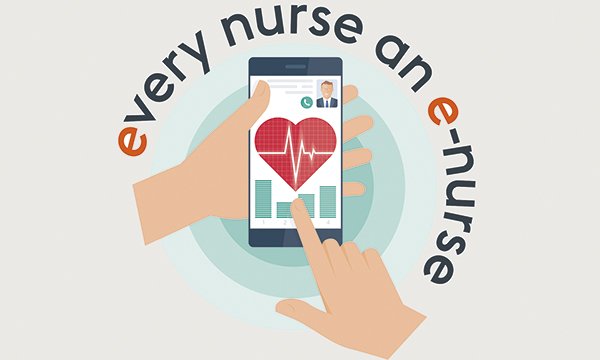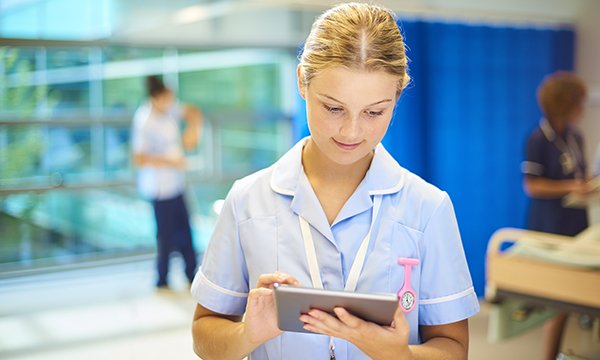Digital literacy part 1: You can be an e-nurse

In the first of a series of six articles on digital literacy, Lynne Pearce offers a quick guide on what it means, why it matters - and why you don’t have to be a ‘techie’ to make the technology work for you
I keep hearing the term ‘digital literacy’. What does it mean?
![]() Health Education England (HEE) defines digital literacy as ‘the capabilities which fit someone for living, learning, working, participating and thriving in a digital society’. It says becoming digitally literate involves developing skills, attitudes, values and behaviours across a range of domains. These include:
Health Education England (HEE) defines digital literacy as ‘the capabilities which fit someone for living, learning, working, participating and thriving in a digital society’. It says becoming digitally literate involves developing skills, attitudes, values and behaviours across a range of domains. These include:
- Digital identity, well-being, safety and security.
- Communication, collaboration and participation.
- Teaching, learning and personal-professional development.
- Technical proficiency.
- Information, data and media literacies.
- Creation, innovation and scholarship.
Clearly much of the above has little to do with understanding the technology or being a whizz with digital devices. You just need to know enough to make it work for you. It’s about ‘mastering ideas, not key strokes’, according to Paul Gilster, who pioneered the term digital literacy in a book published in 1997.
Surely nursing is about people, not technology. Why do I need to be an e-nurse?
For the RCN, focusing on technology alone is missing the point. It argues that digital or eHealth is about finding, using, recording, managing and transmitting information to support healthcare, and in particular make decisions about caring for patients. In essence, computers and other devices are simply the technology that enables this to happen.
It’s not about digitising existing services and carrying on as before. There should be improvement. ‘In reality the advantages are gained when work is re-imagined and the technologies are then expertly implemented,’ says the RCN.
Chair of the RCN’s eHealth forum Matt Butler argues that in the longer term, technology can help nursing staff spend longer with their patients. ‘It can free up time,’ he says. ‘It enables communication to take place over distance, which just wasn’t possible before. Using email and other video chat applications helps us to maintain human contact, and do more of it, for better results.’
Are there any other benefits for patients?
A big one is improved patient safety. Information is more legible, accessible and shareable, giving clinicians more accurate, timely and complete data on which to base decisions.
Services can also be more patient-centred, with information about an individual’s preferences more readily available. This is especially useful for patients who may not communicate easily, such as those with learning disabilities or cognitive impairment.
I’m not good with technology. How will I know where to begin?
The likelihood is that you already have lots of skills but don’t realise it. All of us use some sort of technology to improve our daily lives, from a smart phone to a laptop, whether booking holidays, keeping in touch with friends and family, or catching up on a TV series.
Remember how confusing it was when you first tried to send an email – and that has now become second nature. ‘Many skills are easily transferable to our work lives, where they can be used in supporting the best outcomes for all,’ the HEE and RCN say in their document Improving Digital Literacy. ‘When we’re motivated to learn, we do.’
The RCN’s web-based eHealth resources are a useful starting point to find out more about what becoming digitally literate means in practice, with sections on digital skills, including suggested activities and resources.
It’s also worth identifying people who are ‘digital champions’ in your workplace – whether they are formally recognised, or have informally assumed the role – and seeking their advice and tips.

Don’t a lot of these IT schemes to improve patient care end up wasting time and resources?
It’s true that sometimes projects can be much more complex to deliver than first thought, taking longer and costing more. But the advantages can also be far-reaching. For example, a programme to digitise every patient’s records at Cambridge University Hospitals NHS Foundation Trust was initially beset by difficulties, with accusations that the trust had underestimated the scale and challenges of implementation, not least training 11,000 staff to use it.
Today it’s so successful that the trust has become a member of NHS England’s global digital exemplar programme. That’s because nurses and other clinicians now have quicker access to more comprehensive patient information, including test results, assessments, patient observations, prescriptions, care plans and discharge planning. All can be viewed simultaneously by different people anywhere in the trust.
Staff say care has been revolutionised. ‘The system makes it easy to do the right thing, so that patients get the best care and nurses get to have the most patient facing time,’ says Helen Balsdon, assistant director of nursing (informatics). ‘There are quite a few nurses who would say it has released time to care.’
I’m coming up to revalidation. Can becoming more tech-savvy help?
Undoubtedly. For starters, your revalidation must be done online. The Nursing and Midwifery Council (NMC) advises applicants to maintain a portfolio, and while this doesn’t have to be an e-portfolio, many nurses find this the easiest way to keep their evidence and documents all in one place, particularly as accurate and verifiable records must be provided.
RCNi Portfolio complies with all the NMC’s requirements for e-portfolios. It uses a traffic light style system, so you can see at a glance how close you are to compiling everything you need to revalidate. It also allows you to build your evidence quickly and easily, with a library of CPD articles and interactive self-assessment exercises, accessible on any device, including smart phones and tablets.
‘Your online conduct should be judged the same as in real life and be of a similarly high standard’
I use social media to keep in touch with friends and family, but can I get in trouble using it professionally?
Not if you’re careful and use it wisely. On the contrary, it can be a good way to enhance your informal learning and improve your professional networks, enabling you to make contact with leading nurses outside your immediate circle. You can find regular, topical Twitter chats hosted by WeNurses and the RCN.
The RCN’s forums also have their own Facebook pages, closed to non-members, so your posts are only visible to colleagues approved to join the group. But you should still ensure anything you say could not be seen as insulting, threatening or offensive.
You should also avoid posting any comments that could be perceived as bringing your patients, profession, employer or regulator into disrepute. In a nutshell, your online conduct should meet the same high standard as your 'real world' interactions. The NMC has produced guidance on using social media.
There is bogus or misleading information out there. How can I ensure that what I’m using or recommending is safe?
Increasingly, a key aspect of the nursing role is to signpost patients and their families to accessible, accurate and reputable sources of information about their health. ‘If you have any doubts about the information you’re using or recommending, refer to your organisation’s information governance or clinical leadership to check its validity,’ advises Mr Butler.
He suggests only using organisations and websites that are regarded as trustworthy. These include NHS Choices, which says the information it provides is founded on the best scientific knowledge currently available. The National Institute for Health and Care Excellence (NICE) also provides evidence-based guidance, including information for patients.
The RCN produces a variety of free publications covering a wide range of topics, including some offering clinical guidance, while RCNi provides peer-reviewed clinical content via Nursing Standard and its specialist nursing journals.
Test your knowledge on this subject by completing our self-assessment questionnaire
- Find out more and subscribe to RCNi Portfolio here
Lynne Pearce is a freelance health journalist
